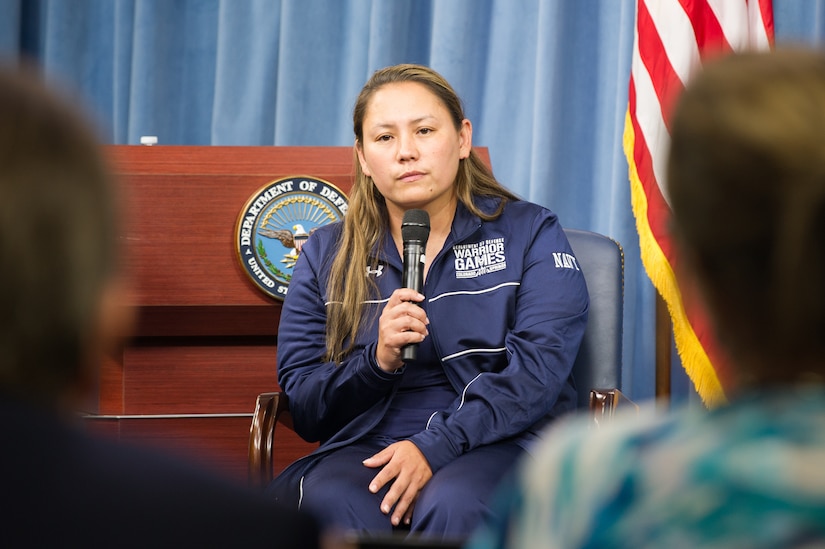By Terri Moon Cronk, DoD News, Defense Media Activity
WASHINGTON -- Despite
suffering serious injuries from an attack by a member of the Afghan security
forces in 2014, Navy Master Chief Petty Officer Reina Hockenberry was
determined to avoid a medical retirement and stay on active duty.
And not only is Hockenberry today serving on the guided
missile cruiser USS Port Royal in Pearl Harbor, Hawaii, the sailor just
garnered eight gold medals from her participation early this month in the 2018
Department of Defense Warrior Games in Colorado, competing in rowing,
powerlifting, swimming and cycling. In late October, she also will compete in
those four events at the Invictus Games in Sydney.
“I was severely injured to the point where a medical
retirement made sense,” she told reporters at the Pentagon yesterday. “But I
can't imagine not serving in the military. It's part of who we are.”
Hockenberry and 13 other American service members were
injured when an Afghan soldier they were training began shooting at them. She
was shot five times -- twice in one of her legs, shattering a tibia, once in
the groin and twice in the stomach. She wore a metal brace on her leg for more
than a year as she went through a grueling limb-salvage process in an attempt
to regrow 6 inches of her tibia.
Walter Reed Treatment, Rehab
The Purple Heart and Bronze Star recipient was treated and
recuperated at Walter Reed National Military Medical Center in Bethesda,
Maryland, for 18 months. During her stay there and at her request, her command
gave her a laptop to continue working.
“Being in the military is embedded in us. That laptop made
me stop being a patient, and it put the power of being a senior chief back in
my identity. It was a big driving force,” she said.
Hockenberry hopes wounded warriors’ resilience, despite
their injuries and illnesses, shows the wounds of war won't stop them from continuing
on active duty and even taking part in such events as the Warrior Games. “There
are a lot of opportunities for us to be just as good and in some cases better,”
she said.
Another Chance
All the stars lined up for her return to active duty, she said.
“People were willing to give me a shot. I kept going, I kept getting better,
and I got the opportunity to go back to Afghanistan in 2016, which was huge. I
showed that I could function in a combat zone. I got to pass my physical
fitness assessments, so by hitting those wickets, and people encouraging me to
hit those wickets … it basically allowed me to come back to full duty.”
Hockenberry got caught up in the stigma that’s still
attached to the term “wounded warrior,” she said. “I shied away from that term
for the longest time because I didn't want people to think that I wasn't as
much as any other sailor. Now I've learned to embrace it.”
The sailors she competed with at the Warrior Games are
amazing people, she said. “They have lived through stuff [that] some people
didn't think they could come out of the other end, and they did. So the fact
that they consider me one of them is such an honor. I don't shy away from the
title.”
For Hockenberry, the bottom line is just because service
members have been injured or hurt doesn’t mean they can’t give their all to
serving in the military.
“If commanding officers and those in higher ranks are
willing to give us a shot, I guarantee you they're going to get their bang for
their buck, because we are people fighting to be there. We want to be there,”
she said. “It's a part of who we are.”









No comments:
Post a Comment